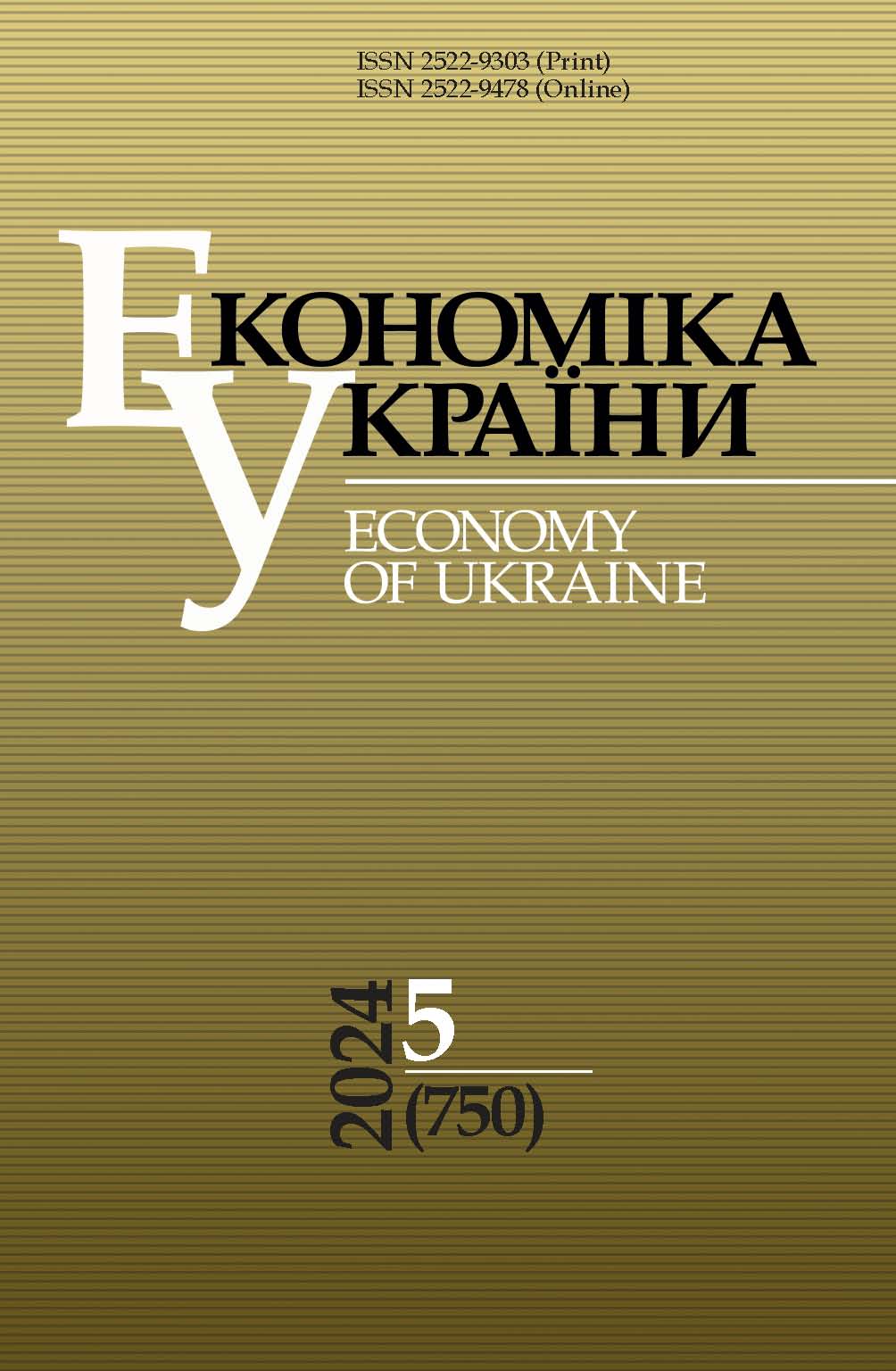STATE SUPPORT MECHANISMS FOR THE USE OF ARTIFICIAL INTELLIGENCE TO ENSURE RESILIENCE OF ECONOMIC DEVELOPMENT
DOI:
https://doi.org/10.15407/economyukr.2024.05.030Keywords:
state regulation mechanisms; artificial intelligence technologies; state support; regulation tools; institutional structure of regulationAbstract
The use of artificial intelligence technologies is becoming more and more widespread, contributing to the creation of new value and increasing labor productivity. At the same time, the global nature of these technologies requires the coordination of the actions of international organizations and leading countries in order to support the use of artificial intelligence through the implementation of effective regulatory and control mechanisms. Taking into account world experience, it is necessary to identify the most effective practices of state support for artificial intelligence technologies and develop recommendations for using their potential to ensure nationally rooted resilience and security of economic development.
In accordance with the OECD recommendations, the approaches and practices of international organizations and individual countries concerning the support for the use of these technologies based on the formation of favorable political environment, the development of digital ecosystems, international cooperation and labor market transformation have been summarized. The need to adopt national legislation in the field of artificial intelligence regulation, taking into account international standards, has been proven. The necessity of organizing new personnel training systems in this field, as well as ensuring regular monitoring of the impact of artificial intelligence on the labor market, is substantiated. The sources of funding for such research and development in Ukraine, for example through the creation of special funds, as well as the main directions of non-financial support, have been identified. It has been proven that the institutional structure of artificial intelligence systems governance should be based on national standards and artificial intelligence ecosystem, an important component of which should be the mechanisms for localization of data processing and storage using the capacities of domestic IT companies. The developed recommendations include directions of state support for the use of artificial intelligence technologies and are intended for state authorities whose purpose is to strengthen the potential of these technologies, ensure digital sovereignty and resilient nationally rooted development.
References
Yanenkova, I. (2020). Advantages and risks of artificial intelligence using in Ukraine and in the world. Efficient Economy. No. 4. https://doi.org/10.32702/2307-2105-2020.4.19 [in Ukrainian].
Mishchenko, V. (2023). Cyber security management in the system for ensuring nationally rooted resilience of economic development. Economic Theory. No. 1. P. 47-72. https://doi.org/10.15407/etet2023.01.047 [in Ukrainian].
Reviglio, U., Alunge, R. (2020). I am datafed because we are datafed: An Ubuntu perspective on (relational) privacy. Philosophy & Technology. Vol. 33. Iss. 4. P. 595-612. https://doi.org/10.1007/s13347-020-00407-6
Clarke, S., Whittlestone, J. (2022). A Survey of the Potential Long-term Impacts of AI: How AI could lead to long-term changes in science, cooperation, power, epistemics and values. AIES '22: Proceedings of the 2022 AAAI/ACM Conference on AI, Ethics, and Society. P. 192-202. https://doi.org/10.1145/3514094.3534131
Cummins, P., Yamashita T., Millar, R., Sahoo, S. (2019). Problem-solving skills of the U.S. workforce and preparedness for job automation. Adult Learning. Vol. 30. Iss. 3. Р. 111-120. https://doi.org/10.1177/1045159518818407
Feijóo, C., Kwon, Y., Bauer, J., Bohlin, E., Howell, B., Jain, R., Potgieter, P. et al. (2020). Harnessing artificial intelligence (AI) to increase wellbeing for all: The case for a new technology diplomacy. Telecommunications Policy. Vol. 44. Iss. 6. 101988. https://doi.org/10.1016/j.telpol.2020.101988
Ess, C. (2020). Interpretative pros hen pluralism: from computer-mediated colonization to a pluralistic intercultural digital ethics. Philosophy & Technology. Vol. 33. Iss. 4. P. 551-569. https://doi.org/10.1007/s13347-020-00412-9
ÓhÉigeartaigh, S., Whittlestone, J., Liu, Y., Zeng, Y., Liu, Z. (2020). Overcoming barriers to cross-cultural cooperation in AI ethics and governance. Philosophy & Technology. Vol. 33. Iss. 4. P. 571-593. https://doi.org/10.1007/s13347-020-00402-x
Wong, P.-H. (2020). Cultural differences as excuses? Human rights and cultural values in global ethics and governance of AI. Philosophy & Technology. Vol. 33. Iss. 4. Р. 705-715. https://doi.org/10.1007/s13347-020-00413-8
Timmers, P. (2019). Ethics of AI and cybersecurity when sovereignty is at stake. Minds and Machines. Vol. 29. Iss. 4. P. 635-645. https://doi.org/10.1007/s11023-019-09508-4
Floridi, L. (2020). The fight for digital sovereignty: What it is, and why it matters, especially for the EU. Philosophy & Technology. Vol. 33. Iss. 3. P. 369-378. https://doi.org/10.1007/s13347-020-00423-6
Mishchenko, S., Naumenkova, S., Mishchenko, V., Dorofeiev, D. (2021). Innovation risk management in financial institutions. Investment Management and Financial Innovations. Vol. 18. Iss. 1. Р. 190-202. http://dx.doi.org/10.21511/imfi.18(1).2021.16
Roberts, H., Cowls, J., Casolari, F., Morley, J., Taddeo, M., Floridi, L. (2021). Safeguarding European values with digital sovereignty: An analysis of statements and policies. Internet Policy Review. Vol. 10. Iss. 3. https://doi.org/10.14763/2021.3.1575
Keping, Y. (2018). Governance and good governance: A new framework for political analysis. Fudan Journal of the Humanities and Social Sciences. Vol. 11. Iss. 1. P. 1-8. https://doi.org/10.1007/s40647-017-0197-4
Hagendorf, T. (2020). The ethics of AI ethics: An evaluation of guidelines. Minds and Machines. Vol. 30. Iss. 1. P. 99-120. https://doi.org/10.1007/s11023-020-09517-8
Liu, H., Maas, M. (2021). ‘Solving for X?’ Towards a problem-finding framework to ground long-term governance strategies for artificial intelligence. Futures. Vol. 126. 102672. https://doi.org/10.1016/j.futures.2020.102672
Ulnicane, I., Knight, W., Leach, T., Stahl, B., Wanjiku, W.-G. (2021). Framing governance for a contested emerging technology: Insights from AI policy. Policy and Society. Vol. 40. Iss. 2. P. 158-177. https://doi.org/10.1080/14494035.2020.1855800
Burnell, R., Schellaert, W., Burden, J., Ullman, T. et al. (2023). Rethink reporting of evaluation results in AI. Science. Vol. 380. Iss. 6641. P. 136-138. https://www.science.org/doi/10.1126/science.adf6369
Grytsenko, A. (2022). Information-digital stage of development of socio-economic systems. Economy of Ukraine. 65. 1(722). 29-46. https://doi.org/10.15407/economyukr.2022.01.029 [in Ukrainian].
Yamashita, I., Murakami, A., Cairns, S., Galindo-Rueda, F. (2021). Measuring the AI content of government-funded R&D projects: A proof of concept for the OECD Fundstat initiative. OECD Science, Technology and Industry. Working Papers. No. 09. https://doi.org/10.1787/7b43b038-en
Pfeifer, M., Marohl, V. (2023). Central Bank RoBERTa: A Fine-Tuned Large Language Model for Central Bank Communications. The Journal of Finance and Data Science. Vol. 9. 100114. https://doi.org/10.1016/j.jfds.2023.100114
Downloads
Published
How to Cite
Issue
Section
License
Copyright (c) 2024 Publisher PH "Academperiodyka" of the NAS of Ukraine

This work is licensed under a Creative Commons Attribution-NonCommercial-NoDerivatives 4.0 International License.



